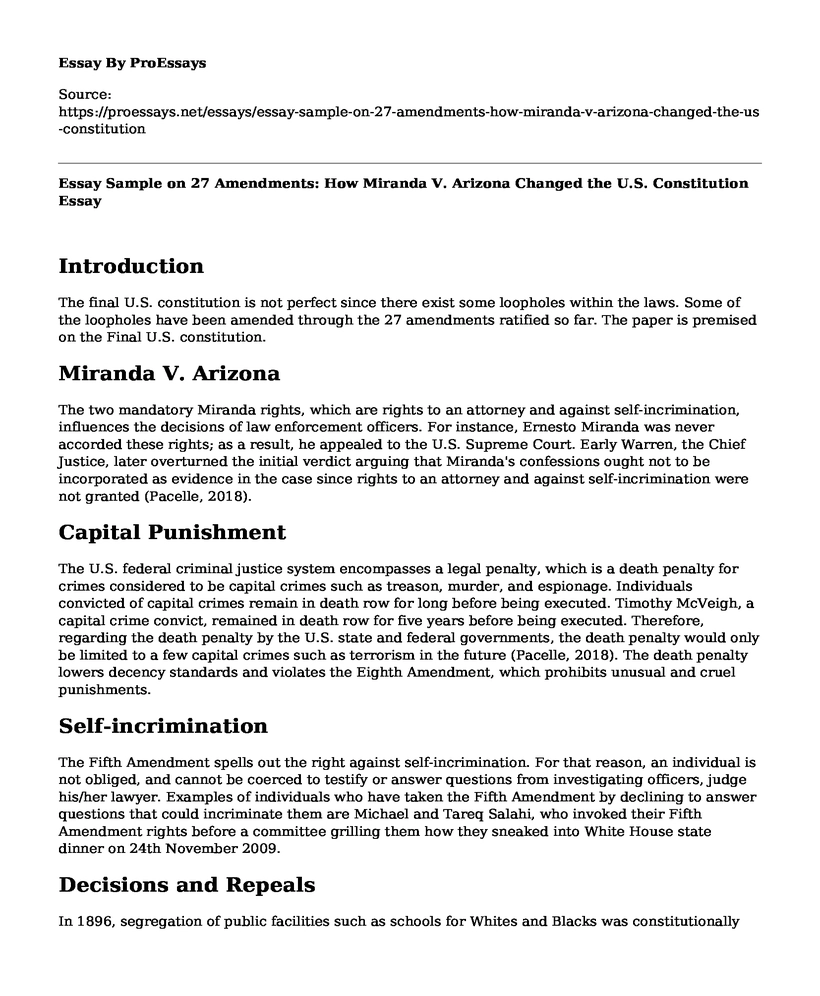Introduction
The final U.S. constitution is not perfect since there exist some loopholes within the laws. Some of the loopholes have been amended through the 27 amendments ratified so far. The paper is premised on the Final U.S. constitution.
Miranda V. Arizona
The two mandatory Miranda rights, which are rights to an attorney and against self-incrimination, influences the decisions of law enforcement officers. For instance, Ernesto Miranda was never accorded these rights; as a result, he appealed to the U.S. Supreme Court. Early Warren, the Chief Justice, later overturned the initial verdict arguing that Miranda's confessions ought not to be incorporated as evidence in the case since rights to an attorney and against self-incrimination were not granted (Pacelle, 2018).
Capital Punishment
The U.S. federal criminal justice system encompasses a legal penalty, which is a death penalty for crimes considered to be capital crimes such as treason, murder, and espionage. Individuals convicted of capital crimes remain in death row for long before being executed. Timothy McVeigh, a capital crime convict, remained in death row for five years before being executed. Therefore, regarding the death penalty by the U.S. state and federal governments, the death penalty would only be limited to a few capital crimes such as terrorism in the future (Pacelle, 2018). The death penalty lowers decency standards and violates the Eighth Amendment, which prohibits unusual and cruel punishments.
Self-incrimination
The Fifth Amendment spells out the right against self-incrimination. For that reason, an individual is not obliged, and cannot be coerced to testify or answer questions from investigating officers, judge his/her lawyer. Examples of individuals who have taken the Fifth Amendment by declining to answer questions that could incriminate them are Michael and Tareq Salahi, who invoked their Fifth Amendment rights before a committee grilling them how they sneaked into White House state dinner on 24th November 2009.
Decisions and Repeals
In 1896, segregation of public facilities such as schools for Whites and Blacks was constitutionally sanctioned by the Supreme Court. However, six decades later, Oliver Brown challenged the denial of her daughter's entry to Topeka school, which was only whites reserved in the court. Brown argued that the Whites and Blacks' schools are not equal and segregation law violates the 14th amendment of equal protection. Despite the court upholding the 1986 segregation doctrine, Brown, together with the other four related cases, was integrated, and filed before the Supreme Court as a single case of Brown v. Board of Education (Wilson, 2017). Eventually, the verdict in 1955 disregarded the separate but equal doctrine and advocated for desegregation.
Conclusion
In summary, the 5th and 14th amendments have impacted significantly in the law enforcement environment. African Americans like the Whites have been able to enjoy the equal rights. Therefore, future amendments aimed at improving the U.S. final constitution should be welcomed.
References
Pacelle, R. (2018). The role of the Supreme Court in American politics: The least dangerous branch. Routledge.
Wilson, W. (2017). Constitutional government in the United States. Routledge.
Cite this page
Essay Sample on 27 Amendments: How Miranda V. Arizona Changed the U.S. Constitution. (2023, Mar 16). Retrieved from https://proessays.net/essays/essay-sample-on-27-amendments-how-miranda-v-arizona-changed-the-us-constitution
If you are the original author of this essay and no longer wish to have it published on the ProEssays website, please click below to request its removal:
- Essay Example on Modern Policing: Adapting to New Technology & Community Objectives
- Essay Sample on The Constitution: Executive Powers & Roles
- Research Paper on Affordable Care Act: Expanding Sustainability & Quality of Wellbeing Protections
- Paper Example on Public Policy: A Guide to Governmental Decision-Making
- Paper Example on Anderson et al. v Cryovac: The Woburn Case and Its Impact
- Essay Example on Sleep Studies in Lab Setting: Problems & Solutions
- Free Essay Example on Leading Small Towns in America: Complex Issues and Engaged Publics







